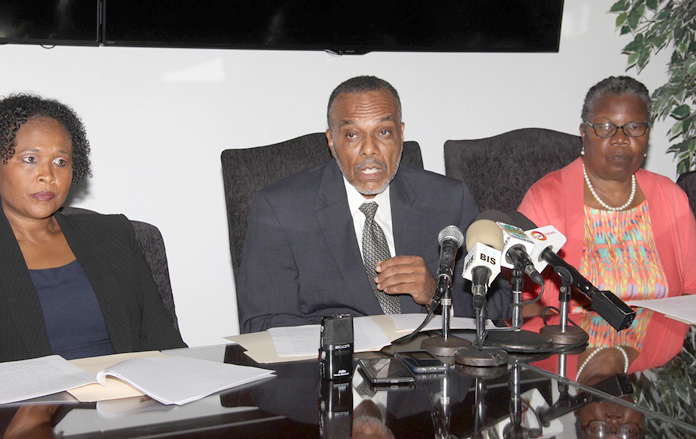
NASSAU, The Bahamas – Prevention is the best form of protection against the possible spread/cases of the Zika Virus, Chief Medical Officer, Ministry of Health, Dr. Glen Beneby said Tuesday.
Addressing a press conference at the Ministry, called to update the country on the measures the Ministry of Health, the Department of Public Health and the Department of Environmental Health Services (DEHS) have put in place in the fight against the possible spread of the disease and/or cases in The Bahamas, Dr. Beneby said prevention will go a long way in preventing the disease.
[Media updates on matters of public health have become an integral part of the Chief Medical Officer’s protocol for updating the Bahamian public on public health matters.]
Dr. Beneby also announced that the Ministry of Health will announce the opening of additional Travellers Health Clinics at the Flamingo Gardens and Elizabeth Estates Community Healthcare Centres “in the near future” to supplement the weekly Travellers Health Clinic established at the Baillou Hill Road Clinic on Wednesdays between the hours of 9am-1pm.
“There is no specific treatment or vaccine currently available for Zika Virus infection, (but) the best form of protection is prevention. Persons are advised to adopt prevention measures such as avoiding mosquito bites by wearing long-sleeved, light-coloured clothing and by applying insect repellants to exposed areas,” Dr. Beneby said.
“Other measures for avoiding mosquito bites include the elimination of mosquito breeding sites in and around living spaces by ensuring that all containers that may collect water – flower vases and plants that grow in water — are either emptied or the water is changed frequently.
“Properly secured door and window screens and the use of safe, household insecticides can also be helpful,” Dr. Beneby added.
Dr. Beneby said there are a number of precautions men and women can take to avoid sexual transmission of the virus.
“If you are a man who lives in or has traveled to an area with Zika and your partner is pregnant, either use condoms correctly from start to finish every time you have sex, or do not have sex during the pregnancy.
“If you are a woman concerned about getting Zika from a male sex partner, you can use condoms correctly from start to finish for all sexual activity. Not having sex is the only way to be sure that you do not get sexually transmitted Zika Virus.
“Pregnant women and women planning to become pregnant should talk to a doctor or other healthcare provider if they, or their male sex partner, recently traveled to an area with Zika, even if they do not feel sick.”
Dr. Beneby also had advice for Bahamian travellers.
“If you are planning to travel please become informed regarding the country you plan to visit. For travellers returning to The Bahamas from a Zika infected area, even if you do not feel sick, you should take steps to prevent mosquito bites for three weeks after return to decrease the likelihood of spreading Zika to mosquitoes that could spread the virus to other people.”
Zika Virus is transmitted primarily by the bite of an infected Aedes aegypti mosquito, the same mosquito that transmits the Dengue, Chikungunya and Yellow Fever viruses. The Aedes aegypti is present in The Bahamas.
“These mosquitoes are commonly found around the home and breed in standing water sources,” Dr. Beneby said. “The mosquito is a day biter with increased biting activity two hours after sunrise and several hours before sunset.”
Other modes of transmission have been identified as: Mother-to-baby; and sexual transmission from an infected partner.
“Persons with Zika Virus infection most commonly have fever, skin rash and conjunctivitis (red eyes). They may also have headache, muscle and/or joint pains. These symptoms usually begin 2-7 days after infection. Only 1 out of 5 infected persons will develop symptoms of the disease. Among those who do, the disease is usually mild and lasts 2-7 days,” Dr. Beneby added.







